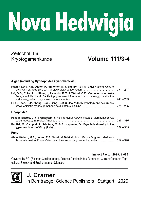
NOVA HEDWIGIA
Scope & Guideline
Championing Excellence in Evolutionary Research
Introduction
Aims and Scopes
- Taxonomy and Phylogeny of Fungi:
The journal extensively covers the classification and evolutionary relationships of fungi, including various groups such as Ascomycota, Basidiomycota, and Mucoromycota, through both morphological and molecular approaches. - Biodiversity Studies:
NOVA HEDWIGIA publishes research on the diversity and distribution of fungi and bryophytes in various ecosystems, often highlighting new species and records from different geographical regions. - Ecological Interactions:
The journal focuses on ecological studies involving fungi and plants, including their roles in ecosystems, interactions with other organisms, and responses to environmental changes. - Conservation and Biogeography:
Research addressing conservation concerns, biogeographical patterns, and the impacts of anthropogenic factors on fungi and bryophyte diversity is a significant aspect of the journal's scope. - Methodological Innovations:
NOVA HEDWIGIA emphasizes novel methodologies in mycological and botanical research, such as molecular techniques and advanced imaging methods, to enhance species identification and ecological studies.
Trending and Emerging
- Molecular Phylogenetics:
There is a growing emphasis on molecular phylogenetic studies to resolve taxonomic ambiguities and understand evolutionary relationships among fungi and bryophytes, reflecting advances in genomic research. - Plant-Fungal Interactions:
Research on plant-fungal interactions, particularly the role of mycorrhizal fungi and fungal pathogens, is gaining traction, highlighting the ecological significance of these relationships in various ecosystems. - Environmental Impacts on Biodiversity:
Studies examining the effects of climate change, urbanization, and habitat alteration on fungal and bryophyte diversity are increasingly prominent, underscoring the urgency of understanding biodiversity in changing environments. - New Species Discoveries:
The journal is witnessing a surge in the discovery and documentation of new species, particularly from underexplored regions, indicating a robust interest in expanding the known biodiversity of fungi and bryophytes. - Ecological Modeling and Conservation Strategies:
Emerging research focuses on ecological modeling to predict species distributions and develop conservation strategies for fungi and bryophytes, reflecting a proactive approach to biodiversity management.
Declining or Waning
- Traditional Morphological Studies:
There is a noticeable decrease in publications focused solely on traditional morphological studies without molecular confirmation, as the field moves towards integrating molecular techniques for more accurate species identification. - Regional Flora Studies:
Research on regional floras, particularly those that do not introduce new species or significant findings, appears to be diminishing, possibly due to a shift towards more global or comparative biodiversity studies. - General Reviews without Novel Contributions:
The journal has seen fewer comprehensive reviews that do not provide new insights or species descriptions, indicating a preference for original research that contributes novel data to the field.
Similar Journals
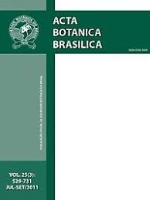
Acta Botanica Brasilica
Unlocking the Secrets of Plant DiversityActa Botanica Brasilica is a prestigious open-access journal dedicated to the field of botany and plant science, published by SOC BOTANICA BRASIL. With an ISSN of 0102-3306 and E-ISSN of 1677-941X, it has been a vital resource for the academic community since its inception in 1987, fostering the dissemination of research and knowledge related to plant biology and ecology. Hailing from Brazil, the journal serves as a platform for researchers to share valuable insights on plant species, their habitats, and important ecological interactions. As of 2023, the journal holds a Q3 ranking in Plant Science and is recognized within the Scopus database, where it ranks #263 out of 516, placing it in the 49th percentile among its peers. This broad accessibility and commitment to quality research make Acta Botanica Brasilica an essential publication for botanists, ecologists, and other professionals in the life sciences, bridging gaps in knowledge and advancing the field with original articles, reviews, and comprehensive research findings.
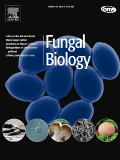
Fungal Biology
Advancing Mycology Through Innovative ResearchFungal Biology, published by Elsevier Science Ltd, is a premier journal dedicated to advancing the field of mycology and its interdisciplinary applications. With an ISSN of 1878-6146 and E-ISSN 1878-6162, this journal serves as a vital platform for researchers and professionals interested in the ecological, evolutionary, and genetic aspects of fungi, as well as their implications in infectious diseases and plant sciences. As of 2023, it proudly holds a Q2 ranking in Ecology, Evolution, Behavior and Systematics and Plant Science, and a Q3 ranking in Genetics and Infectious Diseases, highlighting its significant contribution to these domains. The journal boasts an impressive Scopus rank, including a percentile of 83rd in Ecological studies, ensuring that published research reaches a wide audience and impacts ongoing discourse in the field. With open access options, Fungal Biology encourages the dissemination of high-quality research, aimed to foster collaboration and innovation among scholars and practitioners. With its convergence of knowledge from 2010 to 2024, this journal is instrumental for those advancing the understanding of fungal biology and its myriad applications in environmental and health sciences.

NEW ZEALAND JOURNAL OF BOTANY
Cultivating Insights into New Zealand's Unique FloraThe New Zealand Journal of Botany, published by the esteemed Taylor & Francis Ltd, serves as a pivotal platform for disseminating significant research in the fields of Ecology, Evolution, Behavior and Systematics, as well as Plant Science. With a rich history dating back to 1963 and an impressive convergence extending to 2024, this journal has established itself as an essential resource for researchers and professionals dedicated to understanding the complexities of plant life and ecological systems in New Zealand and beyond. The journal is currently categorized in the Q3 quartile for both relevant disciplines as of 2023, reflecting its balanced influence within the global academic community. Although not an open access journal, it retains a significant impact factor, evidenced by its Scopus rankings, which place it within the top half of its categories. This makes it an invaluable tool for students, researchers, and academics aiming to engage with robust, peer-reviewed scientific findings and contribute to the evolving discourse surrounding botany and ecological research.
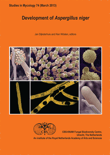
STUDIES IN MYCOLOGY
Connecting Scholars to the World of MycologySTUDIES IN MYCOLOGY is a premier journal dedicated to advancing research in the field of mycology, published by the renowned WESTERDIJK FUNGAL BIODIVERSITY INSTITUTE. With an impact factor that places it in the top quartile (Q1) of both Agricultural and Biological Sciences and Plant Science categories, it holds a prestigious position in the scientific community, ranking #1 out of 193 in its field as per Scopus metrics. Since its transition to Open Access in 2008, it has made significant strides in disseminating high-quality research widely, fostering a greater understanding of fungal biodiversity and its ecological impact. Covering a broad spectrum of topics related to mycology, the journal aims to provide researchers, professionals, and students with a platform for sharing innovative findings, stimulating academic discourse, and promoting collaborative efforts within this vital area of study. Hailing from the Netherlands, STUDIES IN MYCOLOGY serves as an invaluable resource for exploring the complexities of fungi, their interactions with various ecosystems, and their practical applications in agriculture and beyond.
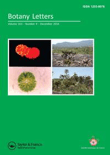
Botany Letters
Fostering Global Collaboration in Plant ResearchBotany Letters, published by Taylor & Francis Ltd, is a prominent journal in the field of Plant Science based in the United Kingdom. With its ISSN 2381-8107 and E-ISSN 2381-8115, the journal has established itself as an essential resource for researchers, professionals, and students alike, focusing on innovative studies and findings in botany. As a Q2 ranked journal in its category (2023) and holding a respectable Scopus rank of #200 out of 516 in Agricultural and Biological Sciences, it reflects a robust commitment to quality and relevance in the field. The journal's open access model ensures that groundbreaking research is readily accessible, fostering collaboration and knowledge sharing among the global scientific community. Covering a broad spectrum of topics within plant science from 2016, Botany Letters aims to catalyze advancements in the understanding and management of plant biodiversity and sustainability, ultimately contributing to conservation efforts and agricultural innovation.

TAXON
Unraveling the complexities of ecology and plant science.TAXON is a premier international journal published by Wiley, dedicated to the fields of ecology, evolution, behavior, systematics, and plant science. With a distinguished history since 1970 and a commitment to advancing knowledge in the biological sciences, TAXON has been recognized in the Q1 category for both its ecological and plant science contributions as of 2023. The journal boasts an impressive Scopus ranking, placing it in the 76th percentile for Ecology, Evolution, Behavior and Systematics and the 74th percentile for Plant Science, highlighting its significance and impact within these domains. While not an open-access publication, TAXON offers a wealth of high-quality research articles, reviews, and discussions, making it an indispensable resource for researchers, professionals, and students alike seeking to deepen their understanding of biodiversity and systematics. For access to its cutting-edge research, readers can follow the journal's updates and contributions online.
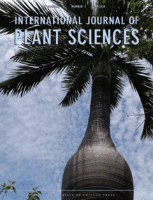
INTERNATIONAL JOURNAL OF PLANT SCIENCES
Connecting researchers with groundbreaking plant studies.The INTERNATIONAL JOURNAL OF PLANT SCIENCES, published by UNIV CHICAGO PRESS, is a leading journal dedicated to advancing knowledge in the fields of plant sciences and ecology. With an ISSN of 1058-5893 and an E-ISSN of 1537-5315, this journal has been a prominent platform for groundbreaking research since its establishment, featuring works from 1983 to present. It holds an impressive Q2 ranking in both Ecology, Evolution, Behavior and Systematics and Plant Science, reflecting its reputable standing within the academic community. The journal is well-regarded for its rigorous peer-review process and commitment to high-quality publication standards, making it a favored choice for researchers, students, and professionals eager to engage with the latest findings and innovative methodologies in plant research. While it does not currently operate under an Open Access model, the journal provides ample access options for institutions and individuals keen to explore its curated content. By presenting diverse studies that blend theoretical and practical insights, the INTERNATIONAL JOURNAL OF PLANT SCIENCES plays a critical role in fostering interdisciplinary dialogue and advancing the frontiers of plant science research.

TELOPEA
Fostering Understanding of Plant BiodiversityTELOPEA is a distinguished scholarly journal published by the Natl Herbarium New South Wales, focusing on the rich fields of Ecology, Evolution, Behavior, and Systematics, as well as Plant Science. With an ISSN of 0312-9764 and an E-ISSN of 2200-4025, the journal has been a significant contributor to the understanding of plant biodiversity and ecosystem dynamics since its inception in 1984, with regular publication resuming in 2006 through to 2024. Residing in the beautiful Australian Botanic Garden at Mount Annan, NSW, TELOPEA operates under a Q3 ranking for both Ecology and Plant Science as of 2023, reflecting its relevance and contribution to these critical scientific disciplines. Though it does not offer open access, the journal remains an essential resource for researchers and professionals seeking to contribute to and stay abreast of the latest developments in plant sciences and ecological research. With a commitment to rigorous peer review and the dissemination of high-quality research, TELOPEA stands as a vital platform for advancing knowledge in the realm of plant ecology and systematics.

PLANT SYSTEMATICS AND EVOLUTION
Transforming Understanding of Plant LineagesPlant Systematics and Evolution is a prestigious journal published by Springer Wien, dedicated to advancing research within the fields of plant taxonomy, evolution, and ecology. With its ISSN 0378-2697 and E-ISSN 1615-6110, this journal has been pivotal in shaping the scientific landscape since its inception in 1974. Based in Austria, it occupies a significant position in the academic community, being ranked in the Q2 quartile in both Ecology, Evolution, Behavior and Systematics and Plant Science as of 2023. This high-impact journal is recognized for its rigorous peer-review process and is indexed among the top publications in its category, holding a Scopus rank of #176 out of 516 in Plant Science and #252 out of 721 in Ecology, highlighting its relevance and quality in the research community. Although it does not currently offer open access, the journal is committed to making significant contributions to the understanding of plant biodiversity and evolutionary processes. This makes it an essential resource for researchers, professionals, and students aiming to know the latest developments in the study of plant systematics and evolution.
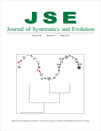
Journal of Systematics and Evolution
Pioneering Research for a Sustainable FutureThe Journal of Systematics and Evolution, published by WILEY, is a premier academic journal dedicated to advancing the fields of Ecology, Evolution, Behavior, and Systematics and Plant Science. With a distinguished Q1 ranking in both of these critical categories in 2023, it stands at the forefront of scientific research, placing it in the top quartile among its peers. Featuring both an ISSN of 1674-4918 and an E-ISSN of 1759-6831, the journal has been converging innovative research since its inception in 2008. The journal caters to a global audience of researchers, professionals, and students, providing a platform for disseminating significant findings and fostering academic dialogue. Its impressive Scopus rankings further affirm its impact, coming in at Rank #62/721 in Ecology and Rank #48/516 in Plant Science, highlighting its relevance and influence in these vibrant fields. As an open-access journal, it ensures that groundbreaking research is accessible to all, thus enhancing collaborative opportunities within the scientific community.